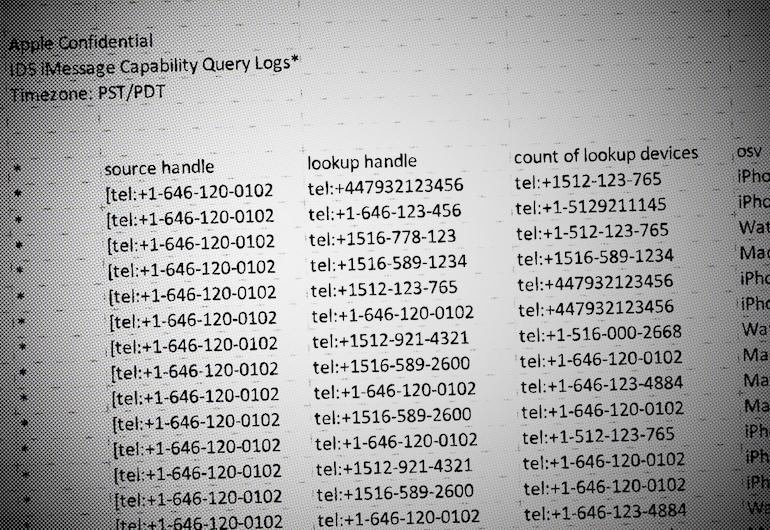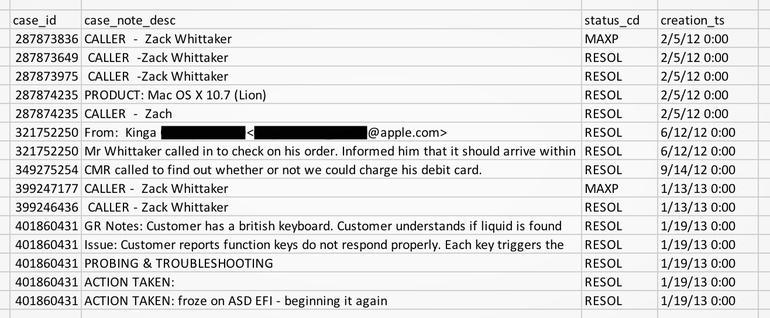 5016
5016
 2018-05-17
2018-05-17
Zack Whittaker from ZDNet asked Apple to give him all the data it's collected on him, because he first became a customer in 2010 with the purchase of his first iPhone. That was nearly a decade ago. As most tech companies have grown in size, they began collecting more and more data on users and customers -- even on non-users and non-customers. After a few weeks, Zack got reply from Apple. Apple sent back the data collecting on him, two dozen Excel spreadsheets at just 5MB in total.

Apple says that any data information it collects on you is yours to have if you want it, but as of yet, it doesn't turn over your content which is largely stored on your slew of Apple devices. That's set to change later this year when the tech giant will allow customers to download their data archives, largely to comply with new European data protection and privacy rules. And, of the data it collects to power Siri, Maps, and News, it does so anonymously -- Apple can't attribute that data to the device owner.
Here are Zack got the data sent from Apple.
AOS Orders contains an entire history of devices and accessories I've bought from Apple dating back to my first purchase. It also includes the five separate occasions I bought new earphones roughly once per year because my cat had chewed through them.
CRM Installed Product is a list of every Apple device ever bought, including highly detailed information -- like serial numbers, a note on if a device is unlocked, unique networking MAC addresses for Bluetooth, Ethernet and Wi-Fi connections, and any other identifying information on a device.
CRM AppleCare Case Contact contains basic contact information on the account holder, such as name, address, and phone number -- and if the user opts into marketing emails and phone calls.
CRM AppleCare Case Header included every interaction I've had with customer support. Every time you call, a company representatives make notes about the customer's problem, and also describes the next steps or the outcome of the call.
You can see how that looks here:

CRM Warranty includes all the information on a device owner's warranty, what AppleCare coverage they have -- if any, and when warranties expire.
DS Signons is a long list of every time you logged in to iTunes and from which specific device, and contains peripheral information like if the login failed.
Game Center predictably contains information on all the gaming sessions a user has played or interacted with -- which in my case, as you'd expect, is limited to almost zero.
iForgot keeps a log of every time you visited your Apple ID page on the web, or reset your password.
iTunes Match Uploads retains a record of every song you've ever uploaded to iTunes Match service, which matches your music with higher quality and downloads that copy instead. The list also includes your user agent information, which can identify your device.
iTunes Match Downloads similarly keeps a list of all matched music that's later downloaded from iTunes Match.
iTunes Downloads contains a user's entire download history since the account's creation -- from apps, songs, albums, videos, and movies -- from the iTunes Store. It also includes information on which device the item was downloaded and its IP address.
Repair Transaction Details recounts every time you put in a repair request with Apple, and includes information on what the issue is, any notes made by Apple staff, and any information that identifies the device, such as a phone's IMEI number.
Marketing Contact includes the information that Apple uses to contact you for marketing reasons, and the reason why -- such as if the user has a developer account.
And that's it -- there's really not much to it.
Zack also commented, "As insightful as it was, Apple's treasure trove of my personal data is a drop in the ocean to what social networks or search giants have on me, because Apple is primarily a hardware maker and not ad-driven, like Facebook and Google, which use your data to pitch you ads."
Source: zdnet